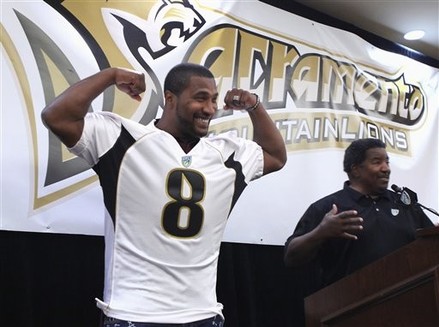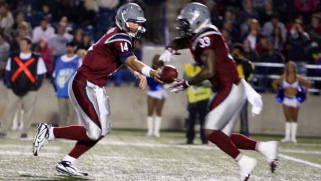TFG Exclusive: An Inside Look at the UFL, Currently Hanging On By a Thread
Four hours before the Virginia Destroyers took the field in last October’s UFL Championship game, owner Bill Mayer had a message for his players. Mayer’s words were not the typical pep talk an owner might give in that situation, something like being the “pride of the community” or “making history.” He was there to make a simple promise: play in the game and you will get paid by the following Friday. The Destroyers beat the Las Vegas Locomotives 17-3 that day. But the paychecks did not come. Just as they hadn’t come for the 2010 champions.
As it stands now, the UFL is fighting for its survival.
The Reality: From Big Splash to Big Thud
Launched in 2009 after Paul Pelosi [husband of former Speaker of the House Nancy Pelosi] led a group of investors to purchase four franchises, the United Football League garnered attention, not so much because it was a new professional football league, but because of the plethora of NFL-experienced coaches and players along for the journey. The inaugural teams were located in the marquee markets of New York City (Sentinels), Las Vegas (Locomotives), Orlando (Florida Tuskers) and the San Francisco Bay Area (California Redwoods), and former Jacksonville Jaguars executive, Michael Huyghue, was named the league’s first commissioner. The foundation for success was there, particularly after the league secured television contracts with Versus and HDNet.
In 2010, the UFL relocated two franchises (New York City to Hartford and San Francisco Bay Area to Sacramento), added a fifth franchise in Omaha (Nighthawks), and upped its scheduled games from six to eight. Even so, the league struggled to generate publicity or, more importantly, revenue.
Before the start of the 2011 season, the league announced it would expand into Virginia Beach (Virginia Destroyers). However, with national television contracts expiring and no new deal on the horizon, the UFL was forced to contract the teams in Hartford and Florida, operating with just four teams and a quagmire of financial issues.
Destroyers President John Wuehrmann likens the UFL’s issues to that of a startup. “Things can be scary,” Wuehrmann said. “This league is a little like putting a jigsaw puzzle together with water. It’s constantly moving with a lot of fluidity.”
Even before the UFL, Wuehrmann had firsthand experience with the difficulties inherent in the world of startups. After working in the NFL for 25 years, in positions ranging from assistant film director for the Bears to coaching administrator for the Chargers, Wuehrmann left the Chargers in 2006 when the Marty Schottenheimer Era came to a close. Without a new NFL position, Wuehrmann moved to North Carolina to work for a golf startup, which he says “crumbled because of bad timing with investor dry-up.” Needing to make ends meet, Wuehrmann wound up painting doors and digging ditches for a general contractor until Schottenheimer, the soon-to-be new coach of the Destroyers, called him in 2010.
Wuehrmann’s golf venture may have folded due to bad to timing, but timing has been the least of the issues with the UFL. The league’s birth came at a time when the NFL was king (and continues to be so), giving it a promising opportunity to latch on to the NFL’s successful tentacles (read: ancillary businesses). With NFL Europe folding in 2007 and the Arena League shutting its doors (temporarily) in 2008, the UFL had no competition for a developmental league on American soil when it launched. This allure of being in the NFL’s “minor leagues” attracted established NFL veterans like J.P. Losman and Koren Robinson, coaches Denny Green and Jerry Glanville and many other household names.

Daunte Culpepper and Denny Green sought to rebuild in the UFL
But bad business decisions have led the UFL to its current state of chaos. Most notably, at least in hindsight, is the league’s failure to reach some sort of partnership agreement with the NFL. According to a report by ESPN’s Chris Mortensen, the UFL sought out a 30% investment from the NFL in the Spring of 2010. The dollar amount was undisclosed in the report, but the NFL would have “had a member on the UFL’s board and a role in football operations.” A potential partnership was also “rumored” by Pro Football Talk in the same time period. The rumor, which the NFL vehemently denied, suggested the NFL “offered the UFL $50 million for 51% ownership and the UFL countered with $49 million for 49%.”Whether the rumors were true or not, no partnership deal with the NFL, which would have brought instant credibility, and more importantly, cash to a league thirsting for funds, was reached.
Not helping matters were the copious amounts of excessive spending. Examples of excessive spending spread throughout the league to the players–like Clint Oldenburg, former offensive tackle for the Destroyers–whose paychecks were being withheld.
“Their corporate headquarters in Florida were in a beautiful building that they were paying an exorbitant amount of rent on. All these bills started to add up,” said Oldenburg.
The tipping point on the UFL’s financial woes was reached in early 2011, when the UFL’s television deals with Versus and HDNet expired and no replacement network was secured. HDNet founder Mark Cuban soon filed a lawsuit claiming the UFL defaulted on a $5 million loan he provided the league the previous July. As a result of these mounting financial difficulties, the final two weeks of the season were canceled. According to Oldenburg, players were not paid for those games, even though their contracts called for it.
Oldenburg, who spent four seasons in the NFL, joined the Destroyers after being released by the Redskins during training camp last year. While he’d like to play professional football again, it won’t be in the UFL.
“I would not play in the UFL again,” Oldenburg said. “I enjoyed my experience. I had Marty Schottenheimer as my coach. Everything was on the up and up with our team but overall league-wise, business-wise, you never knew when you were getting your paycheck.” [Oldenburg currently holds a full-time position as a game developer for Electronic Arts]
Players also have had little access to league information, including updates on when they could expect paychecks. Even the tab to access contact information on the UFL’s official homepage brings up an error message, as do many sections of the site.
On January 31st 2012, former commissioner Huyghue, believed to be behind most of the UFL’s issues, resigned. For many, his resignation signaled the death of the UFL. For others, it signaled a clear path for a new regime, one that just may save the league from extinction.
The Good: A Quality Product
The UFL’s beacon of hope is Bill Mayer, the same owner who broke his promise of prompt payment to the Destroyers’ players. Mayer, a successful investment banker and former dean of the University of Maryland business school, has been involved with the league since 2009. By 2011, Mayer was one of the only owners left with much liquidity and may have single-handedly saved the league last season.
“As I understood it, there was a deal worked out [last year] between the [four] owners where they would all put into an ante,” Destroyers quarterback Chris Greisen explained. “They would have to ante up at certain times. One of the owners was unable to do that, so Mayer stepped up and put in the other owner’s ante, knowing that he’d get paid back and keep things, like payroll, going. It was very generous of him to show his passion to the game and the league. He wanted the players to get paid.”
Greisen, Oldenburg and all the Destroyers players finally received their paychecks last month.
Following the Championship game, the players learned that Mayer did, in fact, attempt to pay them as well as other players owed money, but as soon as he deposited funds they were instantly withdrawn to cover a variety of debts from the league.
For Greisen, a 35-year-old quarterback who has made stops in the NFL, NFL Europe and Arena Football, the UFL affords an opportunity to “keep the dream alive,” that dream being to play in the NFL again. The UFL allows guys like Greisen to get on film for scouts, which he says is much more advantageous than going to a team’s headquarters for a workout as a free agent. When the league cancelled games last year, it was a missed opportunity for film more than anything else.
Greisen also says the road from the UFL to the NFL is less winding than other supplementary leagues because the UFL is played outdoors and mostly adheres to NFL rules.
“You don’t get looks from NFL scouts in Arena,” Greisen says. “Not to brag, but in 2007, my first year starting in an Arena Football League, I broke almost every single-season record. I was with the Georgia Force, owned by Arthur Blank and the Falcons. I couldn’t get a sniff, a tryout, anything to go up to Atlanta.”
Even though Greisen is of advanced quarterback age and in a place where he admits the NFL “thinks his time has passed,” the UFL has extended his dream. He has been called up for stints with the Dallas Cowboys the last two years. (While mostly filling a role on the practice squad, Greisen was on the Cowboys active roster for the final game last season.) And because of his time in the NFL, Greisen qualified for the NFL’s Continuing Education benefit and is in the midst of earning a Master’s in Applied Leadership.

Chris Greisen led to Destroyers to the Hambrecht Trophy in 2011
At its base, that path to or back to the NFL is why the UFL has drawn in names like Dominic Rhodes, Maurice Clarett, Josh McCown, and Troy Brown.
Even for the players who may view the NFL as more of a pipe dream than reality, the UFL stands alone in keeping that door open. According to Greisen, when the UFL had a held a tryout in its first year, 1200 guys showed up even with a $60 fee.
Because of this deep pool of motivated talent, one issue not plaguing the UFL is its quality on the field. “No one will ever tell you the football is bad. They’ll say ‘wow, there are top notch players out there,’” Greisen said.
It was the level of play and opportunity to teach that jarred Marty Schottenheimer out of retirement last year, according to Wuehrmann. But whether Schottenheimer will have the opportunity to continue coaching in the UFL remains a highly uncertain question.
The Unknown: Following Halas’ Footsteps?
The league is moving forward without a new commissioner, and instead led by Mayer and Locomotives owner William Hambrecht, two men with exponentially more business acumen than previous UFL leadership. Hambrecht, a fellow investment banker, was responsible for helping companies like Apple and Google go public. Mayer and Hambrecht spearheaded a meeting this past April in Las Vegas to emphasize leaving the errors of the past behind and, more specifically, secure a new TV deal.
Without that deal, it may be hard for the UFL to survive.
Wuehrmann, for one, has a lot of faith in the new leadership and thinks they have a good shot at a fourth season. For now, he’s busy in Virginia Beach working on relationships from sponsors to practice field deals, as well as simply serving as a conduit of information for players. In a sign of hope, he is also receiving a consistent paycheck.
To put the bumpy road of startups in perspective, Wuehrmann suggests fans consider a former startup before giving up on the UFL. “We’re in year four,” Wuehrmann said. “If you want to go back and look at a struggling business, go back and look at the Bears in 1924. George Halas was just like us, struggling to make payroll, trying to figure out how to minimize expenses.”
But Halas didn’t fail to reach a partnership with the NFL or have to worry about them as competition. He was the NFL.



